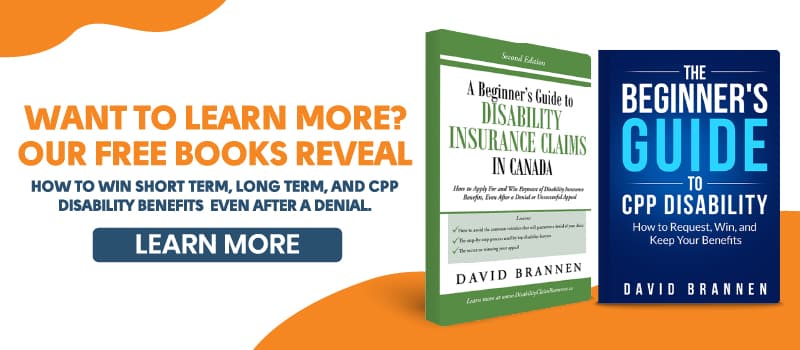We wrote ADHD Disability Benefits: The Ultimate Guide for 2025 for adults in Canada who need to win or maintain disability benefits for Attention Deficit Hyperactive Disorder (ADHD).
Receiving disability benefits for ADHD can have a number of benefits, particularly during the early diagnosis period. Individuals with this disorder often struggle with focus and concentration. They may have difficulty paying attention to the important tasks on their plates each day. What’s more, they may end up getting distracted by details instead of keeping their attention on the task they’re supposed to be managing. While ADHD can mean increased creativity and enhanced problem-solving capabilities, it can also mean difficulty performing work-related duties.
This guide is meant to give you an overview of the types of benefits you may qualify for and the challenges you will face.
Because you are reading this guide, we know you are on the right path. Educating yourself is the single most important thing you can do to improve your chances of success with any disability claim.
What is ADHD?
Worldwide, about 2.8% of the population is estimated to have ADHD, including an estimated 2.7% of Canadian adults over the age of 20. ADHD diagnoses have increased steadily over the past several years as physicians have become more aware of the potential symptoms. Diagnosis in girls and women has also grown immensely.
There are a number of common symptoms associated with ADHD. Typically, they are divided into two categories: hyperactivity and inattentiveness.
Inattentiveness
The symptoms of inattentive ADHD may present as a short attention span. People, especially children with ADHD, may be easily distracted or have trouble sticking to repetitive tasks. They may appear forgetful or lose things often. They may also jump from one activity to the next, often for no apparent reason.
Hyperactivity
When most people think of ADHD, they think of hyperactivity: a child who cannot sit still in their seat, someone who constantly fidgets or talks for hours on end. People with hyperactive ADHD may have overall poor impulse control. While children might, for example, struggle to wait in line or seem to engage in constant, unnecessary physical movement, adults may engage in risk-taking behaviours, make reckless decisions, or struggle to think before they act. They may also talk excessively, especially about things that interest them.
Adult symptoms
By the time they reach adulthood, many patients with ADHD have learned to minimize and cope with the symptoms they used to get in trouble for as a child.
Instead, symptoms may present as carelessness, inability to focus and poor organizational skills. Adults with ADHD may also engage in more frequent risk-taking activities and have trouble staying quiet.
Additionally, adults with ADHD are also more likely to suffer from anxiety or depression and may engage in more approval-seeking behaviours.
Is ADHD a disability in Canada?
Yes. ADHD is considered a disability in Canada, and adults with severe ADHD can receive disability benefits for the struggles they may face.
Keep in mind most disability benefits programs in Canada do not give-out benefits based on a medical diagnosis. Instead, they provide benefits based on the level of disability caused by the medical condition. To qualify for benefits, you must show that the level of disability from your ADHD meets the eligibility criteria of the disability benefits plan in question.
Have more questions about disability benefits and what conditions might qualify? Check out our article for more information on what Medical Conditions Qualify for Disability Benefits or browse the articles below:
Types of ADHD disability benefits for adults Canada
If you become unable to work because of ADHD, you have a few options. You might be eligible for disability benefits from the government, your employer, or your insurer.
This list covers the possible ADHD disability benefits for adults in Canada:
- Employment Insurance (EI) sickness benefits
- Short-term disability insurance
- Long-term disability insurance
- CPP disability
- Workers Compensation
- Veterans Affairs Canada
- Provincial disability benefits
- Disability tax credit
In this section, we are only going to overview EI sickness benefits, CPP disability and long-short-term disability benefits, as these are the most common disability benefits for ADHD. However, check out our article on medical conditions and disability benefits to learn more about the eligibility requirements for the other programs listed.
Employment Insurance (EI) sickness benefits
EI sickness benefits are temporary disability benefits. They are paid through the federal government’s employment insurance (EI) program and cover 55% of your salary for 15 weeks.
These benefits can be extremely useful when people with ADHD are struggling with more severe symptoms and need time to get their symptoms under control. For example, a patient might use EI benefits while adjusting to a new medication.
To qualify, you must have paid into the EI program recently. You pay through deductions from your paycheque. These are automatic. So, if you got an official paycheque, you paid into the EI program.
You apply for EI benefits online through Service Canada. You can apply from home or at any Service Canada office. Your doctor needs to fill out a form to confirm that you can’t work for the 15 weeks that EI covers. And finally, your employer will need to issue a Record of Employment (ROE) to confirm your sick leave.
Please note: If you qualify for short-term disability, you can’t claim EI benefits simultaneously.
You can learn more about EI by visiting our EI sickness benefits program article.
Short-term disability insurance
Short-term disability (STD) benefits are another temporary disability payment. They pay 50-67% of your regular salary. You can usually get them for 15-17 weeks, but sometimes longer. You’ll typically receive payments every two weeks.
Employers offer these benefits either through the company or a group insurance policy. In both cases, employers hire an outside agency to run the program on their behalf.
You only qualify if you have a plan through your job. Not all employers offer this to their employees. If your employer doesn’t, you might be able to get EI sickness.
As I said before, if you qualify for STD, then you won’t qualify for EI. If you can get STD payments, you have to apply for those instead of EI.
You apply by getting the forms from your employer or the insurance company. The application includes three forms. There is one for you, one for your doctor, and one for your employer. It’s up to you to get all the forms back to the insurer.
If your application gets denied, you can ask for a review. This is called an internal appeal. During the appeal, your claim gets reviewed by someone else in the company. You can have three or four of these appeals. After that, you may have to appeal to an outside judge or file with the courts. Your options will depend on your situation.
Long-term disability insurance
As you may guess, long-term disability (LTD) benefits pay for a longer period of time. If you win a claim for LTD, the payments can last for many years. A policy will specify that the benefits last a number of years — 2, 5, or 10, for example. Or, they last until you reach a certain age — usually 65.
LTD payments often cover 50-67% of your monthly salary. They are paid once a month rather than every two weeks. Like STD benefits, most LTD benefits come from group plans or private policies.
If your company offers a group medical plan, then check it for LTD benefits. If you’re in a union, your medical plan will likely include LTD.
You can also get them through private insurance policies if you’re self-employed or underinsured. With private policies, the payment is usually fixed, but sometimes it’s a percentage of your earnings.
You apply for LTD by filling out forms and sending them to the insurer. Once again, you’ll probably have three forms. There should be one for you, your employer, and your doctor. And again, it’s your job to submit them. You won’t get a decision until the insurer gets all the forms.
You can appeal a denial, just as with an STD claim. Your LTD plan may allow two to three internal appeals. After, you’d need to do an appeal hearing with an outside judge — or a lawsuit.
For more information, check out our Ultimate Guide to Long-Term Disability Benefits.
CPP disability
Canadian Pension Plan (CPP) disability benefits offer long-term disability payments for Canadians who cannot work due to a severe and prolonged disability.
If you qualify, then you can get paid until age 65. Currently, payments range from $524.64 to $1,464.83 per month. The amount is based on how much you paid into the program. The more you contribute, the more you’ll get back. Like with EI, if you had a job with a paycheque, you paid into CPP.
To qualify for CPP disability, you must have the right amount of credits. You can get credits by credit splitting with a former spouse or paying into another country’s pension plan. Or, you can qualify for credits if you leave work to raise a child.
You can get LTD and CPP at the same time. The LTD insurer usually has the right to offset your payments by the same amount. For example, if you get $900 from CPP disability, your insurer can reduce its payment by $900 for the same month.
Even with enough credits, you still need to prove that your disability is “severe and prolonged.” A severe disability prevents you from regularly working a paying job. A prolonged disability has little hope for improvement.
You apply for CPP disability by filling out the forms. Your doctor or nurse practitioner will have to fill out the medical report. Then, you send your application to your province’s designated Service Canada office.
If Service Canada denies your claim, you can appeal on two levels. The first is a reconsideration appeal. You must request this appeal within 90 days of denial. If denied again, then you appeal to the Social Security Tribunal. The deadline is 90 days as well.
A judge or a three-person panel at the tribunal will decide your claim. You can attend the hearing to give evidence and answer questions.
How to win an ADHD disability benefits for adults in Canada
Adults with ADHD have to work extra hard to prove they need and deserve disability benefits. Here are some key things to do throughout the claims process to improve your chances of wining ADHD disability benefits.
Appropriate medical diagnosis
An official medical diagnosis on its own won’t guarantee benefits; however, it is a critical part of the process. Without a diagnosis, you may find it very difficult to get any type of disability benefits. Furthermore, a lack of an official diagnosis can make it very difficult to establish ADHD as the reason behind your difficulties.
Appropriate treatment
As part of the disability claim process, benefits providers will look at what treatment you have received for ADHD and whether that treatment aligned with the accepted standards of treatment for your condition. Not getting the appropriate treatment is one of the most common reasons for a denial of benefits.
Failing to get the proper treatment can happen for two reasons: either your doctor didn’t follow accepted standards for treatment, or you refused to participate in the treatment plan. Even if you and your doctor believe that alternative methods may work better, you have to try the standard treatments to qualify for disability benefits. Otherwise, you leave the door open for someone to say that you could work if you had the right treatment.
Documented treatment plan
When you apply for ADHD disability benefits, you will need to show documentation of your current treatment plan. This includes your former treatment plans and how you intend to move forward with future treatment.
Insurance companies will never approve disability benefits for ADHD without a well-documented treatment plan. Your doctor may have a plan, but if it isn’t documented and communicated to the insurance company, then it’s the same as no plan.
Sometimes you can’t get appropriate treatment because you’re waiting for an appointment with a psychiatrist or psychologist. In these situations, you can still be approved for disability benefits if your doctor has a well-documented treatment plan. The plan should include the fact that you’re waiting for a consultation with other specialists. It must also show that you’re doing all other recommended treatments in the meantime.
Medications and side effects
Are you taking medication for your ADHD or pursuing any other medically accepted treatment options? Often, medical treatment for ADHD will mean using appropriate medications to help limit symptoms. If you aren’t using medication to deal with your ADHD symptoms, you may have trouble winning disability benefits.
Evidence of work-related limitations
With an invisible illness like ADHD, disability benefits providers place great emphasis on how hard you try to stay at work.
You must go well beyond saying you can’t do your job. You need to show that you asked for help from your employer to stay at work. Such changes could include fewer hours, easier duties, or changing roles within the company.
You need to provide evidence that shows how hard you tried to stay at work. This evidence can include the following:
- Medical records discussing your work attempts
- Employment records that show places you tried to work and all accommodations made
- A written statement from you that details your work efforts
- Signed written statements from your employer or co-workers describing how they observed your struggle to work
If you give strong evidence that shows you tried your best to stay at work, then you have a good chance of winning benefits. On the other hand, if you have little evidence of your efforts, or evidence that you made no effort, then you have no chance of approval.
Credibility
Medical and employment documents will give you some of the best support for your claim, but the decision-makers need to believe you, too. In legal settings, credibility refers to a person’s trustworthiness or believability.
A decision-maker who finds you trustworthy may rule in your favour — even if you have weak evidence for your claim. And a decision-maker who doesn’t trust you won’t give you the benefit of the doubt in uncertain areas, even with good evidence. Being credible gives you an invisible edge that many people overlook.
Credibility killers:
- Contradicting medical records or earlier statements
- Making excuses or blaming others for problems
- Criticizing other parties in the claim (even if they deserve it)
- Filing complaints against professionals you see as negative, biased, or unprofessional
- Using aggressive, sarcastic, or confrontational tones in your claim or testimony
- Blocking or stalling reasonable requests for information
- Fighting with doctors over your diagnosis instead of focusing on the disability
- Acting like a medical expert
Credibility boosters:
- Making sure what you say matches the medical records
- Taking responsibility for bad facts or problems with your claim; not blaming others
- Being cooperative and respectful of everyone in the claim
- Accepting expert advice and opinions
- Making good faith efforts to try all reasonable advice, even if you disagree with it
- Obvious efforts to keep working
Common reasons for denial of ADHD disability benefits for adults in Canada
ADHD claims may be denied for a number of reasons. Let’s go over some of the most common reasons for a denial so you can avoid making these mistakes in your claim.
Insufficient evidence of disability
Insurers often cite insufficnet evidence of disability as a reason to deny diabsility benefits for ADHD. This will usually happen if you have yet to recieve a diagnosis.
If you receive this as a reason, you should get a diagnosis as soon as possible. However, if you’ve already been diagnosed, your appeal letter should focus on how your doctor followed best practices for diagnosis and treatment. Mention how you adhered to the recommended treatment faithfully. You should also emphasize all the things you’ve done to keep working. These aspects can make up for a lack of objective evidence.
Incorrect treatment
Your claim may also get denied because you have received the wrong or inadequate treatment for your disability. This reason for denial shifts the blame to you or your doctor. It supposes either your doctor offered the wrong treatment or you refused the right treatment. This is the most common reason for denial of disability benefits for ADHD.
The insurers look for examples of your doctor not following best practices. They want to make sure your doctor explores all options. This includes changing your dose or finding other medications to try. It’s especially bad if there’s evidence that you refused to take medications or stopped without your doctor’s advice.
If you refuse to attend cognitive behavioural treatment (CBT) or similar treatments, you might get denied disability benefits. This can happen if your doctor doesn’t recommend it when it would be appropriate to do so. It can also happen if CBT was recommended and you refuse to attend or drop out against your doctor’s advice.
Lack of documentation
Insurance companies will deny many claims because of a lack of medical documentation. So, even if your doctor follows best practices and you follow their advice — if it isn’t recorded, it’s like it never happened.
It’s common in cases of ADHD for the insurance company to ask for your doctor’s clinical records. They do this to see if the doctor is following best practices — adjusting medication and making appropriate recommendations. If the doctor’s medical file doesn’t document what’s happening, then the insurance company will deny your claim.
Toxic work environment
In some cases, you may have your ADHD disability benefits claim denied because the insurer feels that you work in a toxic environment and that the toxic environment, not your disability, is making it impossible for you to complete your usual work tasks. Therefore, this is a human resources problem for your employer — not a situation where you would qualify for disability benefits.
To combat this argument, you need to prove that your disability would exist regardless of where you worked or whether it was toxic or not. These situations can be tricky, however. We suggest hiring a lawyer if your insurer is making this kind of argument.
Do you need help getting ADHD disability benefits?
The journey to winning ADHD disability benefits for adults in Canada can be a long one. An experienced disability lawyer can help. Book a free consultation today to learn more about how Resolute Legal can help you obtain disability benefits for ADHD.
We have offices located in Toronto, Ottawa, Moncton, and Halifax, and we cater to clients in all provinces except Quebec. We offer 90% of our services online and will meet you in person if required. Learn more by checking out the pages below:
Service areas:
Office locations:
Get your free book



